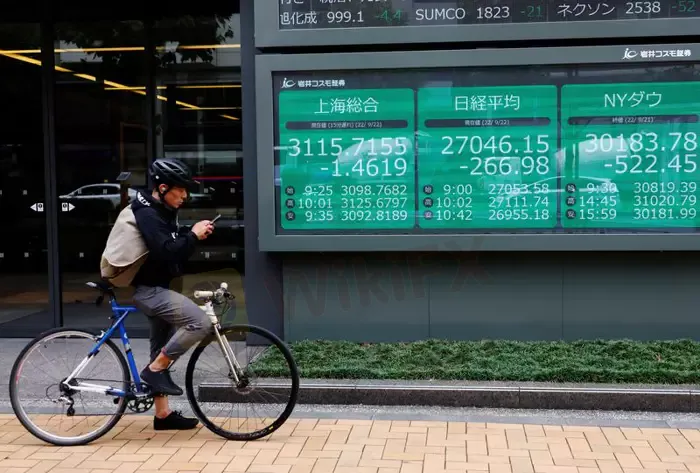简体中文
繁體中文
English
Pусский
日本語
ภาษาไทย
Tiếng Việt
Bahasa Indonesia
Español
हिन्दी
Filippiiniläinen
Français
Deutsch
Português
Türkçe
한국어
العربية
Asia's Stocks Reached A Four-Month High As The Chinese Economy Reopened
Abstract:On Thursday, Asian stocks surged on investor optimism about China's recovery from the COVID-19 outbreak, while the dollar remained under pressure despite the Federal Reserve's caution against market expectations on interest rate reduction this year.

SINGAPORE, (Reuters) - On Thursday, Asian stocks surged on investor optimism about China's recovery from the COVID-19 outbreak, while the dollar remained under pressure despite the Federal Reserve's caution against market expectations on interest rate reduction this year.
MSCI's broadest index of Asia-Pacific equities outside Japan surged 1% in early trading to a four-month high. Japan's Nikkei 225 index recovered from a three-month low.
China immediately lifted ultra-strict travel and activity restrictions, allowing the virus to infect the country's 1.4 billion citizens. Many funeral homes and hospitals report being overburdened, but investors believe that after the virus waves pass, life and expenditure will return to normal, and they are seeing past the most urgent concerns.
“China reopening has a major impact...globally,” said Joanne Goh, an investment strategist at DBS Bank in Singapore, since it not only boosts tourism and spending but also helps to alleviate some of the supply-chain constraints anticipated in 2022.
“There will be hitches along the road,” Goh warned during a press conference. “We give it six months to become used to the procedure. However, we do not believe it is reversible.”
China's central bank also said tonight that it would provide financial assistance to stimulate domestic consumption and critical investment projects, as well as to sustain a stable real estate market.
E-commerce and consumer companies were among the top gainers in Hong Kong, propelling the Hang Seng 2% higher to a six-month high, while reopening prospects pushed China's yuan to four-month highs, supporting regional equities and currencies.
On Thursday, the yuan gained roughly 0.2% to 6.8750.
China has lifted an unofficial restriction on Australian coal imports, and the Australian dollar hit a three-week high overnight, slightly below $0.69. It most recently spent $0.6833.
Oil was the most cautious, plunging dramatically overnight on fears that China's near-term outlook is uncertain and that a global recession could damage demand. [O/R]
Brent oil futures were stable at $78.42 a barrel on Thursday, after falling 1.5% on Wednesday.
Rates alert
Asia's confidence comes as minutes from the Federal Reserve's December meeting were released on Wednesday, with a warning against late-year rate reduction that markets have priced in.
According to the minutes, Fed committee members expressed concern that “unwarranted relaxation in financial conditions” might hinder attempts to restore price stability.
“In Fed language, this is a caution to markets that being too enthusiastic may backfire,” said Vishnu Varathan, head of economics at Mizuho Bank in Singapore.
“That is, if premature rate reduction bets lead to looser financial conditions, the Fed may need to tighten much more to compensate.”
Fed funds futures pricing indicates that traders believe the benchmark US interest rate will peak at just around 5% in May or June, before easing somewhat in the second half of 2023.
Wall Street indexes varied on Wednesday before finishing with slight gains, while futures struggled in Asia trade, with S&P 500 futures down approximately 0.4% at the time of writing.
Treasuries held on to recent gains, with 10-year rates falling a dozen basis points to 3.7070% this week. When prices rise, yields fall.
The dollar has been shaky in currency markets as investors try to navigate between the Fed's hawkish tone and the support for riskier currencies fueled by China's reopening.
The yen was recovering overnight losses and rising 0.5% to 131.87 per dollar, as traders expect Japan to tighten policy this year.
Unseasonably mild weather in Europe has disappointed skiers while benefiting the euro, which has benefited from lowering gas costs. Overnight, benchmark Dutch gas prices plummeted to 14-month lows, as the euro rose to $1.0619. [FRX/]
Stay tuned for more forex market news.
Download and install the WikiFX App from the download link below to stay updated on the latest news, even on the go. You can also download the app from the App Store or Google Play Store.
Download link: https://www.wikifx.com/en/download.html

Disclaimer:
The views in this article only represent the author's personal views, and do not constitute investment advice on this platform. This platform does not guarantee the accuracy, completeness and timeliness of the information in the article, and will not be liable for any loss caused by the use of or reliance on the information in the article.
Read more

Robinhood Launches Prediction Markets Hub for Trading Events
Robinhood introduces prediction markets for events like the Fed rate and sports, partnering with Kalshi for regulated U.S. access to futures trading.

U.S. Stocks Bounce Back for Two Consecutive Days, Is a Positive Outlook Ahead?
The U.S. stock market has rebounded for two consecutive days. Could this signal a potential turning point, or is it just a temporary uptick? Let's explore the market movements, their underlying causes, and how investors should respond.

U.S. Consumer Weakness: Is It Good or Bad?
U.S. retail data for February came in below expectations, raising concerns about slowing consumer spending. Does this signal the beginning of an economic slowdown, or is it just a temporary fluctuation? Let's dive into the analysis.

Acuity Trading and interop.io have joined forces
Acuity Trading and interop.io have joined forces to streamline financial data integration, enabling traders, brokers, and institutions to access real-time market intelligence without disrupting their existing systems. This partnership represents a significant step forward in addressing one of the financial industry’s most persistent challenges—integrating vast amounts of market data from diverse sources.
WikiFX Broker
Latest News
Beware: Forex Investment Fraud Targeting Low Income Earners
Central Bank Policies,Forex Markets and Gold Prices
These 24 Crypto Scams Are Accelerating the Theft of Your Assets
Beware of Fake 'Educational Foundations' Targeting Crypto Investors, Warns North Dakota Regulator
49 Foreigners Arrested in Illegal POGO Raid in Pasay City
We Asked Grok About Illegal FX Brokers—Here’s What It Revealed
Exposing Trading Academy Scams: How Aspiring Traders are at Risk
Online Investment Scams on the Rise: How Two Victims Lost Over RM100K
Vanished Savings: How One Woman Lost RM412,443 to an Online Scam
Investor Alert: FCA Exposes 9 Unregistered Financial Companies
Currency Calculator






